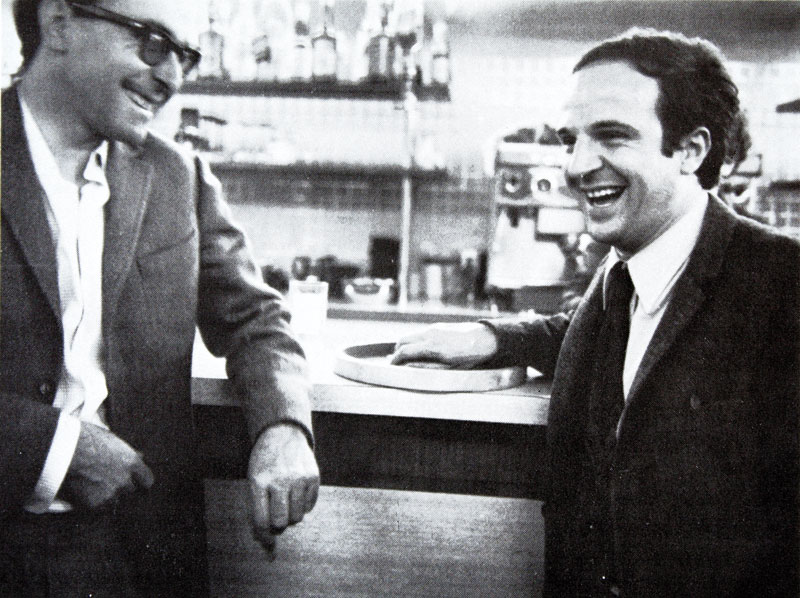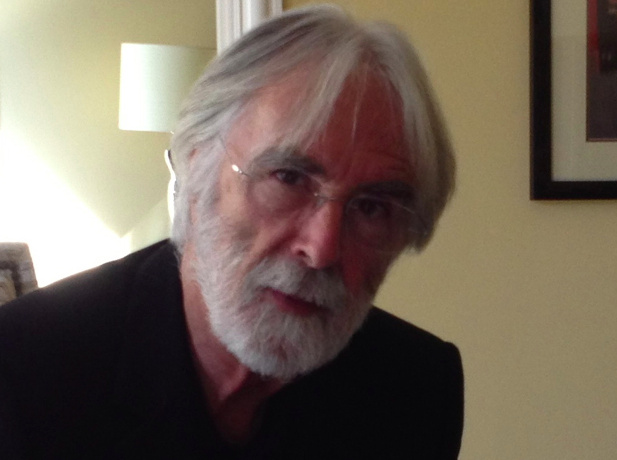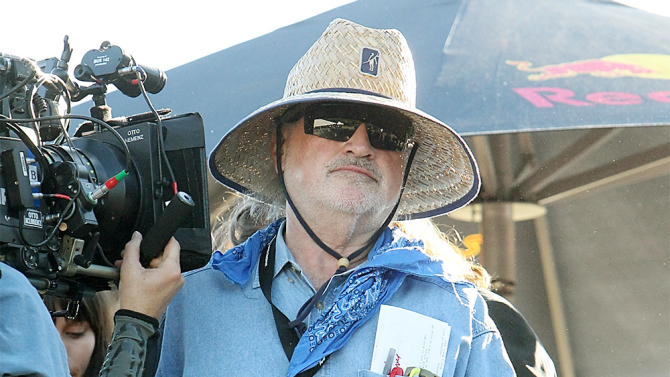By providing your information, you agree to our Terms of Use and our Privacy Policy. We use vendors that may also process your information to help provide our services. This site is protected by reCAPTCHA Enterprise and the Google Privacy Policy and Terms of Service apply.
7 Film Directors Who Should Avoid Making TV Shows (Not Including Lars Von Trier)

The director of such horrific nightmares as “Antichrist” and “Dogville” recently announced that his next project would be a TV show. [EDIT: Not his first TV project — he previously headed up the series “The Kingdom.”] While we’re all for indie auteurs crossing over to the small screen, Von Trier’s particular skill set and unpredictable temperament don’t seem to translate well to the extended format of television.
We then wondered what other directors wouldn’t necessarily be the right people to take on a TV gig — the list below represents picks of folks who might make great movies, but perhaps wouldn’t excel in a serialized format.
Noah Baumbach
Television has always been labeled the writer’s medium, making writer-director Baumbach an obvious choice for who should be making TV, right? Not quite. Baumbach excels with both characters and stories which can only be tolerated for a brief amount of time. “The Squid and the Whale,” his breakout work, tracks a family similar to “The Royal Tenenbaums,” except they’re far uglier. Unlike his frequent collaborator’s smarter-than-thou group, led by a charismatic cheat, the Berkmans have nowhere to go. Bernard (Jeff Daniels) isn’t striving to improve himself and doesn’t seek reconciliation with anyone; his family is both hurt by and mimics his distasteful choices.
Similar things can be said for many of Baumbach’s characters, including those found in “Margot at the Wedding,” “Greenberg,” and “Frances Ha.” Yes, even Frances — played by Greta Gerwig, who had her shot at working in TV with the unordered “How I Met Your Mother” spinoff — wasn’t a person you’d want to track for an arc longer than two hours. Putting up with her oblivious attitude for season after season until she “finds herself” sounds unbearable. Baumbach knows this, hence the brevity of his films (“The Squid and the Whale” is 81 minutes and his longest, “Greenberg,” is under two hours). Perhaps he also knows better than to push his limits in a new medium.
James Cameron
 Unlike others on this list, we have actual proof that James Cameron should stay out of the TV business — specifically, the 2000-2002 series “Dark Angel,” which introduced the world to Jessica Alba but never really managed to build an audience for its odd mix of cyberpunk super-soldiers and ancient blood cults.
Unlike others on this list, we have actual proof that James Cameron should stay out of the TV business — specifically, the 2000-2002 series “Dark Angel,” which introduced the world to Jessica Alba but never really managed to build an audience for its odd mix of cyberpunk super-soldiers and ancient blood cults.
But even leaving aside “Dark Angel,” Cameron’s best work happens when spectacle is given a chance to flourish — in part because it keeps him from needing a solid narrative. On a TV budget, though, a decent story becomes much more important; without gorgeous 3-D CGI, for example, more people will notice that your movie is just “Dances With Wolves” (Or “Fern Gully”) In Space.
One neat thing: After his experience working on “Dark Angel,” Cameron decided to employ a similar writing strategy when it came time to write the three “Avatar” sequels. TV: Now helping make movies better!
Sofia Coppola
 Sofia Coppola’s work is beautiful, ethereal and unique — transformative, even. Her career record isn’t perfect, but all of her films have this beautiful gossamer bubble element to them, something fragile and elegant that…
Sofia Coppola’s work is beautiful, ethereal and unique — transformative, even. Her career record isn’t perfect, but all of her films have this beautiful gossamer bubble element to them, something fragile and elegant that…
…that would just flounder and die on a weekly basis. Repetition has a way of revealing tropes and flaws, and a show under Coppola’s direction would likely start strong, at least in terms of critical acclaim. But the seams would begin to show pretty quickly, and soon the bubble would be popped. Coppola’s career would then include not just financial disappointments, but creative ones. Maybe she could guest direct an episode of “The Leftovers” or something — actually, that’d be a hell of a thing to see. But an entire show under her guidance would struggle much more than it would succeed.
Jean-Luc Godard
 Godard is a filmmaker through and through. Never has that been on better display than with his latest work, “Goodbye to Language 3D.” After crafting countless hours of history lessons for up-and-coming film students, Godard is still toying with the medium he helped put on the map during the French New Wave. “Godard has always taken a cynical approach to narrative,” wrote Indiewire’s Chief Film Critic Eric Kohn in his review of “Goodbye to Language,” later saying the director has “droll contempt for his characters” in the 70-minute feature.
Godard is a filmmaker through and through. Never has that been on better display than with his latest work, “Goodbye to Language 3D.” After crafting countless hours of history lessons for up-and-coming film students, Godard is still toying with the medium he helped put on the map during the French New Wave. “Godard has always taken a cynical approach to narrative,” wrote Indiewire’s Chief Film Critic Eric Kohn in his review of “Goodbye to Language,” later saying the director has “droll contempt for his characters” in the 70-minute feature.
Considering television is where characters come to life — and the constraints of a more profit-driven medium — TV doesn’t seem like the right fit for the great director. His wild, non-narrative creations don’t lend themselves to at-home viewing particularly well, and certainly would test an audience’s patience when it came to weekly endeavors. While television enthusiasts will eagerly accept his documentary and short work, perhaps it’s best if Godard stays away from anything episodic.
Michael Haneke
 Here’s one of the biggest differences between film and television — pretty much any film can delve into the darkness that exists within man’s soul and explore the most loathsome aspects of humanity. After all, it’s only two-ish hours of an audience’s life. A movie exploring these issues can be important and impactful.
Here’s one of the biggest differences between film and television — pretty much any film can delve into the darkness that exists within man’s soul and explore the most loathsome aspects of humanity. After all, it’s only two-ish hours of an audience’s life. A movie exploring these issues can be important and impactful.
However, it’s the rare TV show which pulls off a similar feat — admittedly, these include some of the great modern classics, including “The Sopranos” and “Breaking Bad.” But those achievements are hard-won, and TV history is strewn with the carcasses of shows that were not so lucky. To invite a series into your life involves being able to like at least some of the people involved, and the greatest works of Haneke’s career are not stories about particularly decent or likable folk. It’s one thing to worry about Walter White. It’s another to be convinced that the person on screen is going to torture you to death for fun. Haneke is better off avoiding television.
Terrence Malick
 It’s not that we wouldn’t watch a Terrence Malick TV show — it’s that we have no idea how to watch a Terrence Malick TV show. Since “Badlands,” the director has been trying to construct a narrative without a narrative. He makes films with thinly-veiled through lines, allowing for visual exposition on philosophy both grand and minute. Malick’s camera is always being tugged by invisible string away from our protagonists and toward some cosmic connection usually found in an admittedly stunning, but usually redundant, nature shot.
It’s not that we wouldn’t watch a Terrence Malick TV show — it’s that we have no idea how to watch a Terrence Malick TV show. Since “Badlands,” the director has been trying to construct a narrative without a narrative. He makes films with thinly-veiled through lines, allowing for visual exposition on philosophy both grand and minute. Malick’s camera is always being tugged by invisible string away from our protagonists and toward some cosmic connection usually found in an admittedly stunning, but usually redundant, nature shot.
Television is dominated by story and driven by plot. Characters and scenes can breathe and take their time developing, but the most successful programs create compelling arcs within each episode. Malick needs to be free from these limitations, as well as the time constraints put in place for broadcast television. While he could go the route of the day and make a show for Netflix or Amazon, exempt from the 22 and 43-minute formats, Malick also creates visuals meant to be seen on as big a screen as possible. No one should see “The Tree of Life” on their phone, and I doubt anyone should watch his first TV show in a similar fashion.
Christopher Nolan
 Nolan’s exclusion from the TV genre isn’t based in anything found within his narratives. He’s proven himself a uniquely exciting voice in the world of film and a man perfectly capable of creating challenging work while remaining financially reliable. His films have even spawned at least one TV show (“Gotham” probably wouldn’t have gotten the green light without Nolan revitalizing the Batbrand), and many others could be converted to fit the enticing structure of modern television (imagine binge-watching an “Inception” series).
Nolan’s exclusion from the TV genre isn’t based in anything found within his narratives. He’s proven himself a uniquely exciting voice in the world of film and a man perfectly capable of creating challenging work while remaining financially reliable. His films have even spawned at least one TV show (“Gotham” probably wouldn’t have gotten the green light without Nolan revitalizing the Batbrand), and many others could be converted to fit the enticing structure of modern television (imagine binge-watching an “Inception” series).
So why is he on this list? Nolan doesn’t want to be on it. He’s a film man, all the way, and an outspoken critic of digital video. The DC Comics consigliere said as much in the Keanu Reeves-produced documentary “Side by Side,” where the “Street Kings” star spoke with various directors about the differences between cutting actual celluloid and piecing together clips on a computer. It’s not the only time Nolan’s spoken out against the preferred shooting style of not only television but most films nowadays, and Nolan isn’t afraid to bash the small screen for damaging how people watch his films. Check out the below quote, pulled from the director’s IMDB profile, if you need more reasons to keep the IMAX-adoring cinephile away from TV.
“As soon as television became the only secondary way in which films were watched, films had to adhere to a pretty linear system, whereby you can drift off for 10 minutes and go and answer the phone and not really lose your place.”
We’re not sure what films he’s watching, but you certainly can’t do that with “Mad Men,” “The Leftovers” or “Breaking Bad.”
By providing your information, you agree to our Terms of Use and our Privacy Policy. We use vendors that may also process your information to help provide our services. This site is protected by reCAPTCHA Enterprise and the Google Privacy Policy and Terms of Service apply.

















